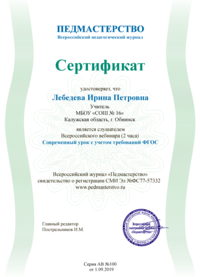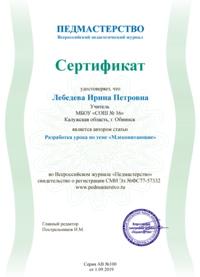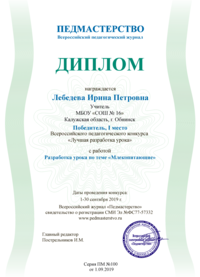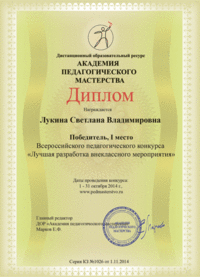Лексико-грамматический практикум по книге для чтения к учебнику « Английский с удовольствием» для 5-6 классов общеобразовательных учреждений
Автор: Николаева Галина Сергеевна
Организация: МОУ СОШ №29
Населенный пункт: Тверская область, г. Тверь
Книга для чтения является составной частью УМК «Английский с удовольствием» для 5-6 классов общеобразовательных учреждений при начале обучения со 2 класса. В книгу вошли оригинальные рассказы для детей и подростков из серии «Rockets» английского издательства”A&C Black: “ Uncle-and-Auntie Pat”, “ Granny’s Jungle Garden”, “ Jenny the Joker”, “ Granddad’s Boneshaker Bicycle” автора Колин Вест. Повествование ведётся в увлекательной эмоциональной форме от лица главного героя, который попадает в ситуации, близкие и понятные школьникам 11-12 лет.
К каждому рассказу предлагаются разнообразные упражнения, которые позволяют обучать чтению, письму, говорению.
Мы предлагаем дополнить задания к каждому рассказу лексико-грамматическим тренажёром, включающим в себя задания по словообразованию (суффиксы, приставки, конверсия), задания по подбору антонимов и синонимов( в том числе и контекстуальных), повторить образование множественного числа имён существительных( исключения из правила), а также 3 формы неправильных глаголов. Небольшой объём заданий позволяет выполнить их максимально быстро, большую часть времени на уроке оставляя для выполнения заданий, предусмотренных авторами книги для чтения. Систематическое выполнение подобного рода заданий позволит активизировать употребление и усвоение новой лексики и перевести её из разряда пассивной в активный лексический запас.
- “ Uncle-and-Auntie Pat”.
-
Find the odd word.
- winner, driver, louder, farmer
- twisty, puppy, shiny, muddy, tatty
- finally, really, only, hardly, quickly
- following, morning, waiting, noticing
- Match the synonyms.
Sad, happy, awful, chuckle, exhausted , exclaim, realize, wish, spot, laugh, notice, dream, giggle, understand, cry, tired, terrible, glum, overjoyed.
- Match the antonyms.
Wake up, miss, right, new, give, top, appear, take, bottom, disappear, notice, old, left, fall asleep.
4. Divide the words into 2 groups according to the suffix.
Magically, shiny, muddy, dramatically, actually, certainly, tatty, twisty, loudly.
5.Give the plural of the nouns.
Goose, pig, chicken, hen, dog, goat, sheep, deer, cat, mouse.
6. Give the 3 forms of the verbs.
Drive, feed, hide, hear, dig, spread, leave, come, arrive, sweep, take, sell, buy.
II.” Granny’s Jungle Garden” .
- Match the synonyms.
See, pleased, suggest, adore, beetle, marvelous, get, offer, happy, notice, receive, wonderful, bug, admire .
- Match the antonyms.
Old, ask, often, far, different, seldom, near, alike, young, answer.
- Which of the words can be both verbs and nouns ?
Clip, measure, work, laugh, water, award, buzz, suggest, offer, weed, help, give.
4.Divide the words into 2 groups according to the meaning ( plants, insects).
Dragonfly, dandelion, grasshopper, newt, buttercup, beetle, bug, daisy, nettle, bee, bramble, butterfly, ladybird.
5 . Make up the new words combining the following ones.
Hedge hog
Butter cup
Weed fly
Wild killer
Grass life
Lady hopper
Dragon bird
6. Divide the words into 2 groups according to the suffix.
Wonderful, marvellous, joyful, joyous, beautiful, nervous, famous, careful, delightful, adventurous.
7. Give the 3 forms of the verbs.
Get, become, see, keep, grow, sweep, admire, think, put, speak, understand, tell.
III.“ Jenny the Joker”.
1.Find the odd word.
- early, funny, itchy, beaky, sunny, dusty.
- slowly, friendly, quickly, really, suddenly.
- joker, rider, driver, rubber, runner, player.
2.Divide into 2 groups according to the suffix.
Sloppy, sweetly, extremely, beaky, funny, actually, suddenly.
3.Make up the adjectives from the following nouns using the suffixes – ful, -y, -ish, - ous.
Dread, itch, nerve, fun, beak, girl, boy, care, child, dirt, dust, fool, fame, wonder, beauty.
4.Match the synonyms.
Trick, toffee, amazing, suggest, silly, bother, offer, worry, foolish, sweet, joke, amusing.
5. Match the antonyms.
Careful, forget, go on, up, lose, begin, first, down, find, end, final, stop, remember, careless.
6. Give the plural of the nouns.
Joke, ink, tooth, carpet, bone, foot, man, woman , child.
IV. “ Granddad’s Boneshaker Bicycle”.
1. Find the odd word.
a. break, saddle, pedal, break, gear
b. bicycle, tricycle, mountain bike, skateboard
c .sad, gloomy, unhappy, merry
d .top-of-the range, first-rate, out-of-fashion
2.Match the synonyms.
Fascinating, start, resist, swap, sure, grin, taken aback, certain, smile, surprised, refuse, begin, change, amazing.
3. Match the antonyms.
Useless, full, rusty, buy, back, easy, indoors, front, difficult, sell, outdoors, empty, useful, shiny.
4. –ed or – ing ?
a .It sounds interest…
b .Granddad looked interest…
c .Mr. Bell was amaz…
d .What an amaz… day!
e. He seemed very much surpris…
f. The exhibition was surpris…
g. The trip was excit…
h. They both were really excit…
5.Give the 3 forms of the verbs.
Choose, throw, see, come, get, ride, find, sell, buy, pay, run, leave, draw, fall, feel, stand.
6. Which of the words can be both verbs and nouns ?
Oil, dust, bless, whistle, colour, offer, help, call, change, hope, notice, head, shop, оpen.
Список использованной литературы.
1. Биболетова М.З. Книга для чтения к учебнику английского языка «Английский с удовольствием» для 5-6 классов общеобразовательных школ.





